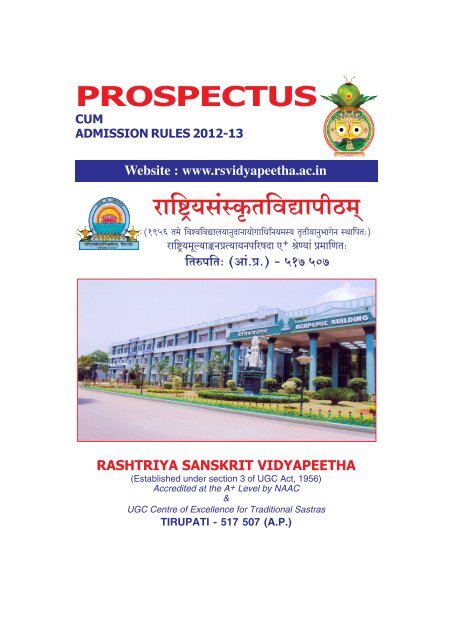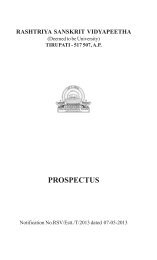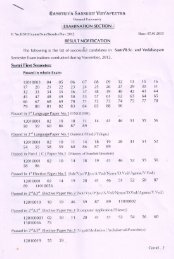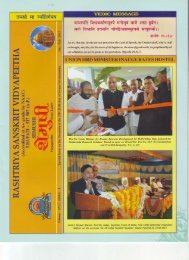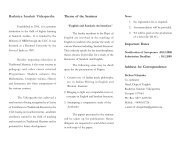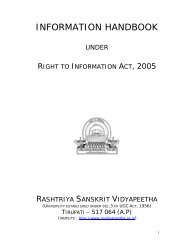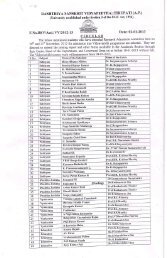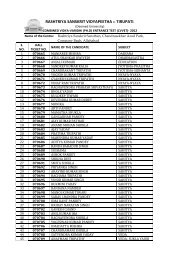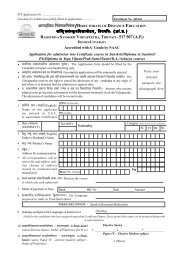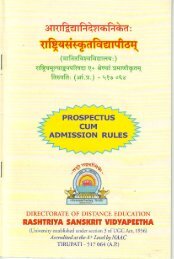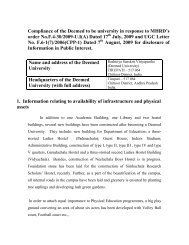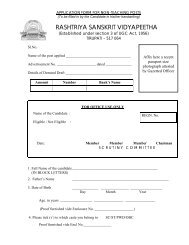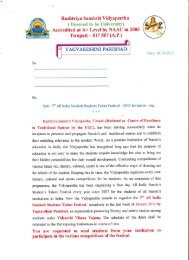2 - Rashtriya Sanskrit Vidyapeetha
2 - Rashtriya Sanskrit Vidyapeetha
2 - Rashtriya Sanskrit Vidyapeetha
Create successful ePaper yourself
Turn your PDF publications into a flip-book with our unique Google optimized e-Paper software.
PROSPECTUS<br />
CUM<br />
ADMISSION RULES 2012-13<br />
Website : www.rsvidyapeetha.ac.in<br />
am{ï´>`g§ñH¥$V{dÚmnrR>_²<br />
(1956 V_o {díd{dÚmb`mZwXmZm`moJm{Y[Z`_ñ` V¥Vr`mZw^mJoZ ñWm{nV…)<br />
am{ï´>`_yë`m‘>ZàË`m`Zn[afXm E+ loÊ`m§ à_m{UV…<br />
{Vén{V… (Am§.à.) - 517 507<br />
RASHTRIYA SANSKRIT VIDYAPEETHA<br />
(Established under section 3 of UGC Act, 1956)<br />
Accredited at the A+ Level by NAAC<br />
&<br />
UGC Centre of Excellence for Traditional Sastras<br />
TIRUPATI - 517 507 (A.P.)
15 TH CONVOCATION OF RASHTRIYA SANSKRIT VIDYAPEETHA, TIRUPATI<br />
<strong>Rashtriya</strong> <strong>Sanskrit</strong> <strong>Vidyapeetha</strong> students with Rolling Shield of<br />
6th All India <strong>Sanskrit</strong> Students’ Talent Festival - 2012<br />
Memorandum of understanding between the National Law School of India University<br />
(NLSIU), Bangalore and <strong>Rashtriya</strong> <strong>Sanskrit</strong> <strong>Vidyapeetha</strong> (RSV), Tirupati
CONTENTS<br />
Sl.No. PARTICULARS Page Nos.<br />
1. Wide Range of Courses ............................................................................... 2<br />
Regular Programmes - Evening & Part-Time Programmes<br />
2. Our Main Academic Support ................................................................. 3<br />
3. Faculties and Departments .................................................................... 4<br />
4. Introduction - Location - Emblem 5<br />
Centre of Excellence in Traditional Sastras<br />
<strong>Vidyapeetha</strong> Accredited at the A + Level by NAAC ............................<br />
5. SALIENT FEATURES ..................................................................... 6<br />
❖ Teaching and Learning Facilities<br />
❖ UGC’s Innovative Programmes.<br />
❖ Remedial and JRF-NET Coaching Centres (for SC, ST and Minorities)<br />
❖ Research and Publications - Career Opportunities - Earn while you learn<br />
❖ All India <strong>Sanskrit</strong> Students’ Talent Festival - Bridge Course<br />
❖ Gold Medals<br />
❖ UGC Special Assistance Programme to Sahitya Department (DRS-1)<br />
❖ UGC Special Assistance Programme to Education Department (DRS-1)<br />
❖ UGC Special Assistance Programme to Faculty of Darsanas (DRS-1)<br />
❖ <strong>Sanskrit</strong> Science Exhibition.<br />
❖ Orissa Chair<br />
❖ Yogavijnan Centre<br />
❖ The Alphabet Gallery (Lipi Vikasa Pradarsini) ; Co-Curricular Activities<br />
❖ Extension Activities<br />
❖ Health Centre, Canteen and Railway reservation counter through IRCTC<br />
6. COURSES OFFERED -<br />
A. Regular Programmes (I - IV programmes) 10<br />
B. Evening and part-time programmes (I - IV programmes) 20<br />
7. How to apply ....................................................................................... 22<br />
8. General rules governing Admission ......................................................... 23<br />
9. Tuition and other Fee particulars for all courses ....................................... 24<br />
10. Scholarships .............................................................................................. 25<br />
11. HOSTELS ............................................................................... 26<br />
Men’s Hostels (Seshachala, Vedachala, Garudachala and Nilachala)<br />
Sri Padmavati and Vidyachala Womens’ Hostels<br />
Annadanam Scheme<br />
Medical facility & Parent’s Rest Room<br />
IRCTC - Indian Railway Catering and Tourism Corporation<br />
12. Mahamahopadhyaya Pattabhirama Sastri Granthalaya (University Library) 27<br />
13. Physical Education<br />
14. Distance Education Programmes - DDE<br />
15. Tentative Academic Calendar for the year 2012-13 28
PROSPECTUS CUM ADMISSION RULES<br />
(for users’ information)<br />
for the Academic year 2012-13<br />
A. REGULAR PROGRAMMES<br />
I. Under Graduate courses<br />
(1) Prak-Sastri(eq. to+2/Intermediate) (4) B.A. (eq. B.A.)<br />
(2) Sastri (eq. to B.A.) (5) B.Sc. (Sastri)<br />
(3) Sastri Vedabhashya (eq. to B.A.)<br />
II. Post Graduate courses<br />
(1) Acharya (eq. to M.A.) in 14 Sastras<br />
(2) M.A. in <strong>Sanskrit</strong> (Sabdabodha Systems & Language Technology)<br />
(3) M.Sc. in Computer Science & Language Technology<br />
Under innovative programmes of UGC<br />
(4) P.G. Diploma in Yoga Therapy and Stress Management<br />
(5) P.G.Diploma in Comparative Aesthetics (Sahitya) in Global Perspective<br />
(One Year)<br />
III.Research Programmes<br />
(1) M.Phil. in 11 Subjects including Manuscriptology and Palaeography<br />
(2) M.Phil. in Education<br />
(3) Vidyavaridhi (eq. to Ph.D.) in all Sastras/Sahitya/Education.<br />
(4) Vidya Vachaspati (eq. to D.Litt.)<br />
IV. Professional Courses<br />
(1) Siksha Sastri (eq. to B.Ed.) ; (2) Siksha Acharya (eq. to M.Ed.)<br />
B. EVENING AND PART-TIME PROGRAMMES<br />
I. P.G. Diploma Courses: (1) Yogavijnan (2) Natural Language Processing<br />
(3) Web Technology<br />
II. Diploma Courses : (1) Temple Culture (2) Pourohitya (3) <strong>Sanskrit</strong>& Law<br />
(4) Management in Oriental Orientation<br />
III.Certificate Courses : (1) Temple Culture (2) Pourohitya (3) Functional English<br />
(4) Jyotisha 5) E-Learning<br />
IV. The <strong>Vidyapeetha</strong> offers the following Career Oriented Programmes as Addon<br />
courses with the financial support of U.G.C.<br />
(1) DTP in Indian Languages (2) Web Technology (3) Puranetihasa (4) Vastu Sastra<br />
(5) Translation Techniques and Creative writing in <strong>Sanskrit</strong> and Regional Languages.<br />
2
Our main Academic Support<br />
Prof. HAREKRISHNA SATAPATHY<br />
Vice-Chancellor<br />
Prof. K. RAMASURYANARAYANA<br />
Dean, Academic Affairs &<br />
Faculty of Sahitya Samskriti<br />
0877-2286600 (Off.) / 2287690 Extn. 261/309<br />
0877-2230181 (Res.) ; 94402 17106 (Mobile)<br />
Prof. K. RAVISANKARA MENON<br />
Dean, Faculty of Education<br />
0877-2288886 (Off.) ; 0877-2287812 (Res.)<br />
Prof. O. SRI RAMALAL SARMA<br />
Dean, Faculty of Darsana<br />
0877-2286177 ; 0877-2287690 (Off.) Extn. 233<br />
0877-3250633 (Res.) ; 93936 20633 (Mobile)<br />
Prof. R.L.N. SASTRI<br />
Dean, Faculty of Vedavedanga<br />
0877-2287690 (Off.) Extn. 236<br />
99080 41293 (Mobile)<br />
Prof. G.S.R. Krishna Murthy<br />
Academic co-ordinator<br />
0877-2287690 (Off.) Extn. 210 ; 94414 08796 (Mobile)<br />
Prof. A. GURUMURTHI<br />
Registrar<br />
0877-2286799 (Off.) ; 0877-2287809 (Fax)<br />
PBX Nos. : 0877 - 2287649 ; 0877 - 2287690 ; 0877 - 2288644<br />
3
Faculties and Departments<br />
Faculty of Vedavedanga<br />
1. Dept. of Vyakarana<br />
2. Dept. of Jyotisha<br />
3. Dept. of Dharmasastra<br />
4. Dept. of Veda Bhasya<br />
5. Dept. of Computer Science<br />
6. Dept. of History<br />
7. Dept. of Mathematics<br />
Faculty of Darsana<br />
1. Dept of Nyaya [UGC Special Assistance Programme - DRS-1]<br />
2. Dept. of Advaita Vedanta<br />
3. Dept. of Visistadvaita Vedanta<br />
4. Dept. of Dvaita Vedanta<br />
5. Department of Agama<br />
6. Department of Mimamsa<br />
7. Dept. of Sankhya Yoga<br />
Faculty of Sahitya & Samskriti<br />
1. Dept. of Sahitya [ UGC Special Assistance Programme - DRS-1]<br />
2. Dept. of Puranetihasa<br />
3. Dept. of English<br />
4. Dept. of Telugu<br />
5. Dept. of Hindi<br />
Faculty of Education (Pedagogy)<br />
1. Dept. of Education [ UGC Special Assistance Programme - DRS-1]<br />
2. Dept. of Physical Education<br />
Dept. of Research and Publications<br />
4
Introduction : <strong>Rashtriya</strong> <strong>Sanskrit</strong> <strong>Vidyapeetha</strong>, a University established under section 3 of<br />
the U.G.C. Act, 1956 is a premier institution in the field of higher learning in <strong>Sanskrit</strong> studies,<br />
Traditional Sastras and Pedagogy. It is funded by the Ministry of Human Resource<br />
Development through UGC. The University has a long history in the service of <strong>Sanskrit</strong><br />
education.<br />
The University was established at Tirupati(A.P.) in 1961 by the Govt. of India on the<br />
recommendations of the Central <strong>Sanskrit</strong> Commission as an autonomous body under the<br />
name of Kendriya <strong>Sanskrit</strong> <strong>Vidyapeetha</strong>, Tirupati society. Dr. S. Radhakrishnan, the<br />
then Vice President of India laid the foundation stone of the University on 4 th January 1962.<br />
The basic objective of setting up the University is to impart and improve <strong>Sanskrit</strong> pedagogy,<br />
to accelerate the pace of higher <strong>Sanskrit</strong> learning and to combine the traditional <strong>Sanskrit</strong><br />
education with modern scientific research.<br />
Later, Kendriya <strong>Sanskrit</strong> <strong>Vidyapeetha</strong>, Tirupati came under the administrative control<br />
of <strong>Rashtriya</strong> <strong>Sanskrit</strong> Sansthan, an autonomous body under the Ministry of Education in<br />
April 1971. In the year 1987, the University was declared as a Deemed to be<br />
University by the Government of India, considering its service to the cause of <strong>Sanskrit</strong><br />
Education, its achievements in research and publications and the general progress it had<br />
made in the past 25 years. It was formally inaugurated by the then President of India<br />
Sri R. Venkatraman on 26th of August 1989. Considering its achievements and potential for<br />
research in Traditional Sastras, the University was given the status of Centre of Excellence<br />
in Traditional Sastras during the X Plan and XI Plan period as well.<br />
The Rashriya <strong>Sanskrit</strong> <strong>Vidyapeetha</strong> has been attracting students from all over India<br />
and the courses offered by it cover a wide range of <strong>Sanskrit</strong> language and literature, Traditional<br />
Sastras, pedagogy and also career oriented programmes. A combination of Traditional Sastras<br />
with modern subjects like Mathematics, Computer Science, History etc., is offered at Sastri/<br />
B.A., B.Sc. and Prak Sastri level. A unique feature of the University is that the medium of<br />
instruction for imparting Traditional Sastras is <strong>Sanskrit</strong>.<br />
Location : The <strong>Vidyapeetha</strong> with a sprawling campus of 42 acres is located at the foot of<br />
the Tirumala Hills, the abode of Lord Sri Venkateswara (Balaji) near Alipiri. The University<br />
campus is adjacent to SVIMS (Sri Venkateswara Institute of Medical Sciences) ; and is at a<br />
distance of 4 k.m. from the Railway Station and APSRTC Bus station. It can be approached<br />
through either the Reservoir Road or Balaji Colony.<br />
Emblem : The motto on the emblem tamaso ma jyotirgamaya speaks of the vision and<br />
idealism for which the University was established. The emblem comprises a circle, a<br />
rectangular base, two lamps on either side, a bunch of palm leaves, the petals of a lotus, each<br />
of which are of immense significance. Besides, it includes the rays of the Sun which are<br />
considered to represent perennial source of creative thoughts.<br />
<strong>Vidyapeetha</strong> — Centre of Excellence in Traditional Sastras : The <strong>Vidyapeetha</strong> has<br />
achieved a rare honour of being recognised as a Centre of Excellence in Traditional Sastras by<br />
the UGC basing on its achievements, academic excellence earned in the field of teaching and<br />
research in Traditional Sastras and its potential for future development. The same has been<br />
5
extended for the XI Plan period also. Under this scheme, the following activities have been<br />
undertaken by the University.<br />
1. Sastravaridhi course.<br />
8. Documentation of Artefacts.<br />
2. Publications.<br />
9. Digitalisation of Manuscripts.<br />
3. Audio and Video documentation<br />
10. Yoga, Stress Management and Healing<br />
4. Audio-Video Recording Centre activities. Centre.<br />
5. Lipi Vikasa Pradarsini<br />
11. Seminars / Workshops.<br />
6. Electronic Tools for Ancient Script Learning. 12. Post Graduate Courses to bridge Computer<br />
7. <strong>Sanskrit</strong> Self Learning Kits.<br />
Science & <strong>Sanskrit</strong> Language Technology.<br />
<strong>Vidyapeetha</strong> Accredited at the A+ Level by NAAC.<br />
The National Assessment and Accreditation Council (NAAC) has accredited the<br />
<strong>Vidyapeetha</strong> at the A+ Level in August, 2003.<br />
SALIENT FEATURES<br />
Teaching and Learning Facilities : The <strong>Vidyapeetha</strong> has introduced centres of learning<br />
such as Functional <strong>Sanskrit</strong> Centre, Computer Laboratory, Language Laboratory etc. The<br />
computer laboratory exposes the staff and students to the various programmes related to<br />
Computer learning. The Functional <strong>Sanskrit</strong> Centre has played a major role in preparing a<br />
comprehensive curriculum and in imparting training to the learners on functional <strong>Sanskrit</strong>.<br />
The new multimedia language laboratory offers an opportunity to the students to learn English<br />
through the use of software. These centres act as major resources for the learners. Learning<br />
becomes a tapasya at the lotus feet of Lord Venkateswara, the Lord of Seven Hills.<br />
UGC’s Innovative Programmes : The <strong>Vidyapeetha</strong> is awarded with two innovative<br />
programmes - (1) Sabdabodha Systems and Language Technology (2) Yoga Therapy and<br />
Stress Management (3) Comparative Aesthetics.<br />
With the financial assistance from the UGC, the <strong>Vidyapeetha</strong> has been offering a PG<br />
Course in Sabdabodha Systems and Language Technology , P.G.Diploma in Yoga Therapy<br />
and Stress Management and Comparative Aesthetics. The University has also been conducting<br />
research and training programmes in the thrust areas of the two programmes.<br />
Remedial and JRF-NET Coaching Centres : The <strong>Vidyapeetha</strong> has started Remedial<br />
coaching centre and JRF-NET coaching centre for Scheduled Castes, Scheduled Tribes and<br />
Minority students from the academic year 2007-2008 with the financial assistance from<br />
University Grants Commission. These two coaching centres have been involved in holding<br />
classes for the students belonging to SC, ST and Minority categories. The students belonging<br />
to other categories and who are in need are also permitted to attend the coaching classes.<br />
Research and Publications : The Research and Publications Department of the University<br />
has brought out more than 165 valuable publications on Veda, Vedanta, Agama, Jyotisha,<br />
Nyaya, Vyakarana, Sahitya, Education, <strong>Sanskrit</strong>-Science as also textbooks and other<br />
reference books in English and other subjects and four CD-ROM’s like <strong>Sanskrit</strong> Learning<br />
CD for beginners, Granthalipi Bodhini and Vacaspatyam. A research journal Mahasvini is<br />
being published bi-annually. The <strong>Vidyapeetha</strong> has been putting its best efforts in bringing out<br />
publications in the rich scientific knowledge hidden in <strong>Sanskrit</strong> literature through Samskrita<br />
Vijnana Vaibhavam Series. Semushi is a <strong>Vidyapeetha</strong> News Letter published bi-montlhy.<br />
Career opportunities : The courses in the University are so designed as to offer job<br />
6
opportunities to students not only in <strong>Sanskrit</strong> institutions but also in other general universities<br />
and educational institutions such as Sainik schools, Kendriya Vidyalayas and Navodaya<br />
Vidyalayas all over India.<br />
The University has been offering several Career Oriented Programmes with the<br />
assistance of the UGC and also other Dual Degree programmes. These programmes<br />
provide necessary training and technical skills to the students in building up their careers.<br />
There is also a lot of scope for self-employment opportunities to these students.<br />
Earn while you learn : The University has been providing opportunities to its students to do<br />
some part-time jobs in the scheme of ‘Earn while you learn’. Most of the students of the<br />
University who have knowledge of working with the computers and other technical skills are<br />
engaged in several research projects and other university programmes enabling them to earn<br />
sufficiently to meet their expenses. It is also contemplated to provide more opportunities in<br />
the coming years to the students and Research Scholars of the University under this scheme<br />
to earn for their maintenance while continuing their regular studies.<br />
All India <strong>Sanskrit</strong> Students’ Talent Festival : All India <strong>Sanskrit</strong> Students’ Talent Festival<br />
is a unique festival undertaken by the University. It was organised for the first time in<br />
February 2007 and has ever since, become a regular and annual event of the University. It<br />
is held for 4 days inviting participants from <strong>Sanskrit</strong> institutions all over India in order to bring<br />
to light the latent talents/skills in the students. The students of this University have the<br />
reputation of participating in this as well as other National Level Competitions. They win<br />
cash prizes, Gold/Silver/Bronze medals. The University also organises many other competitions<br />
and the students are awarded medals and cash prizes.<br />
Bridge Course : The University has been conducting Bridge Courses to the students admitted<br />
into different programmes. Apart from conducting special training programmes and bridge<br />
courses, the univesity conducts remedial coaching in Traditional Sastras, spoken <strong>Sanskrit</strong><br />
and spoken English.<br />
The University has the literary and cultural organisations of the students such as<br />
Vagvardhini parishad, Max Muller English Club, Tulasidas Hindi Parishad and the<br />
recently inaugurated Annamacharya Sahitya kala parishad. The students of the University<br />
through Vagvardhini Parishad conduct several literary and cultural programmes in <strong>Sanskrit</strong>,<br />
thus providing scope and avenue for presenting the hidden talents and skills of the students.<br />
This also helps them in improving the communication skills in <strong>Sanskrit</strong> language. In the same<br />
way, Max Muller English club, Tulasidas Hindi Parishad and Annamacharya Sahitya Kala<br />
Parishad provide scope for students to participate in the essay writing and elocution competitions<br />
and thus help them in developing their talents in communication and other skills in English,<br />
Hindi and Telugu languages respectively.<br />
Gold Medals : To encourage meritorious students, the University has been presenting Gold<br />
Medals to the best graduates of Sastri, Siksha Sastri courses and for the students securing<br />
the highest marks at Acharya level in all the Sastras including Siksha Acharya.<br />
Apart from these, the University has been presenting other Gold Medals, Endowment<br />
Prizes, Cash Prizes etc., to the meritorious students every year during the Convocation ;<br />
These have been constituted by various donors and named after great personalities.<br />
UGC Special Assistance Programme to Sahitya Department : The UGC has sanctioned<br />
Rs.30.50 lakhs to the Department of Sahitya of this University under its Special Assistance<br />
Programme.(SAP) for a period of 5 years in recognition of its academic achievement and<br />
7
viable potential for further research. The main objective of this scheme is to combine teaching<br />
and research and to encourage group research activity in pursuit of excellence.The thrust<br />
area of Sahitya identified under this programme is “Comprehensive encyclopaedia of <strong>Sanskrit</strong><br />
Poetics basing on some standard texts i.e. Kavyaprakasa, Sahityadarpana & Dhvanyaloka”.<br />
UGC Special Assistance Programme to Education Department : The UGC has<br />
sanctioned Rs.29.50 lakhs plus two Project Fellows to the Dept. of Education of this<br />
<strong>Vidyapeetha</strong> under its Special Assistance Programme (SAP). The Dept. of Education of<br />
the <strong>Vidyapeetha</strong> was selected for sanction of the SAP on the basis of its work, academic<br />
achievement and viable potential for further development. The essence and primary aim of<br />
this UGC scheme is a combination of teaching and research to encourage group research<br />
efforts in pursuit of excellence. The special assistance for the Dept. of Education is for a<br />
period of five years. The thrust area of Education identified under this programme is<br />
“Language Development and Material Production”.<br />
UGC Special Assistance Programme to Faculty of Darsanas : On the recommendations<br />
of Expert Committee, the UGC conveyed approval of the Commission to provide financial<br />
assistance to the Faculty of Darshanas of <strong>Vidyapeetha</strong> for a duration of five years under<br />
Special Assistance Programme (SAP). Thrust Area(s) Identified : Navya Nyaya (“A Critical<br />
Suvey of the Commentaries and Sub-Commentaries on Tattvachintamani by Gangesha<br />
Upadhyaya”).<br />
<strong>Sanskrit</strong> Science Exhibition : <strong>Sanskrit</strong>-Science Exhibition aims at highlighting the scientific<br />
wisdom preserved in <strong>Sanskrit</strong> literature. As a part of this project, nearly 140 concepts on<br />
Ayurveda, Chemistry, Astronomy, Aeronautics, Geology, Physics, Botany, Mathematics,<br />
Meteorology, Metallurgy, Economics, Management, Gemmology and Acoustics have been<br />
prepared and exhibited in different places all over India besides the one organised at St.<br />
Petersburg, Russia, at the invitation of the International Centre of the Reoerichs.<br />
Orissa Chair : The Government of Orissa has established the Orissa Chair in the University<br />
with the seed grant of Rs. 50 lacs to do intensive and extensive research; to bring out<br />
publications of such research on Lord Jagannatha and to highlight the contributions made<br />
by Sri Chaitanya Mahaprabhu and the poet Sri Jayadeva to the cultural heritage of our<br />
country. The Chair was formally inaugurated by Justice Sri Ranganath Misra, Former Chief<br />
Justice of India and Chairman, Central <strong>Sanskrit</strong> Board, Government of India on 14-10- 2000.<br />
Yogavijnana Centre : The University has established Yogavijnana Centre with the assistance<br />
of UGC to provide an opportunity for the students, staff and general public for Yoga Education<br />
and Practice. The centre has introduced (1) One year P.G. Diploma in Yoga Vijnana (Part-Time)<br />
evening course. (2) One and half year P.G.Diploma in Yoga Therapy and stress management.<br />
Apart from these courses, the University has introduced ‘Yoga & Meditation’ as one of the<br />
Elective subjects in Sastri Course.<br />
The Alphabet Gallery (Lipi Vikasa Pradarsini) : The gallery arranged in the University<br />
aims at tracing the origin, growth and development of the Indus alphabetic writing from<br />
3000 B.C. to 1500 B.C. and further into Brahmi Script of 300 B.C. from which other Indian<br />
regional scripts had evolved. The early phase of this writing is illustrated with the help of<br />
inscribed Indus seals and seal impressions of Lothal displayed in the Alphabet Gallery. The<br />
methodology adopted in deciphering the Indus script is explained through charts.<br />
Co-Curricular Activities.<br />
NSS : The students form part of the National Service Scheme to channelise their<br />
energies to perform selfless service to the society.<br />
Vagvardhini Parishad which forms part of the University engages itself in allowing<br />
students to take part in elocutions, debates, seminars, quiz etc., every week end.<br />
8
Max Muller English Club, a voluntary organisation run by the students themselves,<br />
under the guidance from the staff of the English Department, aims at developing the<br />
oratory and communicative skills in English of the students of the University.<br />
Tulasidas Hindi Parishad, is an organisation to help students widen their knowledge<br />
in Hindi Literature.<br />
Annamacharya Sahitya Kalaparishad, offers scope for students to enrich their literary<br />
knowledge and to improve the language skills in Telugu.<br />
The Kalaparishad, a cultural organisation involving students and Faculty members,<br />
conducts training programmes in performing arts, organises cultural events, thus bringing<br />
out the talents of the students. It also prepares cultural teams for participation in Inter-<br />
University Youth festivals etc.<br />
In addition to these, the students participate in many co-curricular activities including<br />
Music, Drama, Sports and other Literary competitions conducted in other Universities also.<br />
Gold medals are bagged by the students every year in Inter-University competitions in various<br />
academic, literary and cultural competitions besides winning prizes in sports and games activities.<br />
Extension Activities.<br />
❖<br />
❖<br />
❖<br />
❖<br />
❖<br />
❖<br />
❖<br />
❖<br />
<strong>Sanskrit</strong> Day Celebrations : Every year the University celebrates <strong>Sanskrit</strong> Day on<br />
Sravana Purnima by organising various functions like Kavi Goshthi, Antyakshari,<br />
Ashtavadhanam etc. in a colourful manner for a week.<br />
Spoken <strong>Sanskrit</strong> Courses : The University conducts <strong>Sanskrit</strong> Sambhashana<br />
Sibirams every year for the benefit of the public who are interested to learn <strong>Sanskrit</strong><br />
language. Each Sibiram will be for a period of 10 days to enable them to learn & speak<br />
in simple <strong>Sanskrit</strong>.<br />
Organizing Meetings of Traditional Scholars and Modern Scientists : The<br />
University has become a common platform for interactions among traditional scholars<br />
and modern scientists. The interactions result in the unravelling of various scientific<br />
and technological concepts hidden in our ancient <strong>Sanskrit</strong> scriptures.<br />
Mahamahopadhyaya Pattabhi Rama Sastri Vyakhyanamala : Under a unique<br />
academic programme termed Mahamahopadhyaya Pattabhi Rama Sastri<br />
Vyakhyanamala, a series of extension lectures are arranged every year in memory of<br />
Mahamahopadhyaya Pattabhi Rama Sastri, the First Chancellor of the University. The<br />
lectures are arranged on various shastras during every academic year for the benefit of<br />
faculty and students of the University. Eminent and renowned scholars from different<br />
parts of the country are invited to deliver lectures on traditional shastras.<br />
Health Centre : The health centre will be of great help to everyone who require<br />
medical care for minor ailments. The services of three doctors are utilised for the<br />
emergency health needs of the staff and students. An ambulance, the much needed<br />
vehicle in times of emergency has been the generous gift from the Tirupati Member of<br />
Parliament Dr. Chinta Mohan from the funds given by the Government of India.<br />
Canteen : A canteen run by IRCTC, set up this year is an added attraction on the<br />
campus. With the strength of staff and students growing every year, its presence and<br />
proximity provides them timely refreshments and relaxation.<br />
Ananda Bazaar : The Ananda bazaar is unique as it caters to the needs of dining for<br />
many people at a time. It comes in handy at times of functions conducted by the<br />
<strong>Vidyapeetha</strong>, when more number of guests have to be accommodated.<br />
Simhachala Research Scholar’s Hostel : A Hostel and is to be named Simhachala is<br />
being constructed in the campus of the <strong>Vidyapeetha</strong> to accommodate 150 Research Scholars.<br />
9
one<br />
COURSES OFFERED<br />
The University offers traditional courses in Sahitya, Vyakarana, Jyotisha, Nyaya, Advaita<br />
Vedanta, Vishistadvaita Vedanta, Dvaita Vedanta, Agama, Mimamsa, Sankhya Yoga etc.,<br />
along with modern subjects like Computer Science, Mathematics, History etc.<br />
The Professional Courses offered in the university are Siksha Sastri (B.Ed.) and Siksha<br />
Acharya (M.Ed.) monitored by National Council for Teacher Education (NCTE). Other courses<br />
leading to Diploma, P.G.Diploma and Research Degrees are also offered under various faculties.<br />
A. REGULAR PROGRAMMES<br />
The following are the regular courses offered by the <strong>Vidyapeetha</strong>.<br />
I. Undergraduate Courses.<br />
1. PRAK SASTRI (Eq. to +2/INTERMEDIATE)<br />
No. of Seats : 60 in all the Sastras<br />
Duration : Two years ; Age : 15 to 18 years as on 01-06-2011.<br />
No upper age limit for ladies.<br />
Scheme of study :<br />
Part-1 : 1 st Language : English<br />
2 nd Language : <strong>Sanskrit</strong>/Telugu/Hindi<br />
Part-2 : Paper-1 : <strong>Sanskrit</strong> (Compulsory)<br />
Optional Sastra of Sahitya/Vyakarana/Darsana/Jyotisha will be taught<br />
as part of second year syllabus.<br />
Paper-2 : <strong>Sanskrit</strong> (Compulsory)<br />
Paper-3 : <strong>Sanskrit</strong> (Compulsory)<br />
Paper-4 : Mathematics/History (optional)<br />
Paper-5 : Computers<br />
Eligibility : Pass in one of the following examinations with minimum five or six<br />
papers. The maximum marks should be 500 and above with English as one paper.<br />
(a) S.S.C./CBSE/NOS course with or without <strong>Sanskrit</strong> and pass in ABHIJNA<br />
of Samskrita Bhasha Pracharini Sabha, Chittoor.<br />
(b) Purva Madhyama of (1) <strong>Rashtriya</strong> <strong>Sanskrit</strong> Sansthan, New Delhi.<br />
(2) Sampoornananda <strong>Sanskrit</strong> University, Varanasi<br />
(c) <strong>Sanskrit</strong> Entrance Examination conducted by the Govt. of A.P with English.<br />
(d) Any examination recognized as equivalent to X class with <strong>Sanskrit</strong>.<br />
(e) Veda Bhushan Certificate of Maharshi Sandipani <strong>Rashtriya</strong> Veda Vidya<br />
Pratishtan, Ujjain<br />
(f) Candidates possessing S.S.C without <strong>Sanskrit</strong> are also eligible to join the<br />
course subject to the condition of passing the entrance test in <strong>Sanskrit</strong><br />
conducted by the R.S.<strong>Vidyapeetha</strong>, Tirupati.<br />
10
2. SASTRI (Eq. to B.A.) No. of seats = 100<br />
Duration<br />
: Three years (6 Semesters)<br />
Age : Minimum 17 years (as on 01-06-2011)<br />
Scheme of study : Part I - 1 st Language- English<br />
2 nd Language – <strong>Sanskrit</strong>/Hindi/Telugu<br />
Part II - Three Electives :<br />
1 st elective : One from the following sastras :<br />
1. Sahitya (30) 2. Vyakarana (20)<br />
3. Phalitha Jyotisha(15) 4. SiddhantaJyotisha (5)<br />
5. Nyaya (5) 6. Advaita Vedanta (5)<br />
7. Visistadvaita Vedanta (5) 8. Dwaita Vedanta (5)<br />
9. Mimamsa (5) 10. Agama (5)<br />
(Note : The number in the brackets indicate the number<br />
of seats in each sastra.)<br />
2 nd and 3 rd electives : Any two from the following but not<br />
more than one from each group.<br />
1. English Literature 1. History<br />
Group A 2. Telugu Literature Group B 2. Archakatva& Pourohitya<br />
3. Hindi Literature 3. Yoga & Meditation<br />
4. Computer Applications<br />
No. of seats in Computer Applications – 20.<br />
Eligibility : Pass in any one of the following examinations as in 10+2 pattern.<br />
(a) Uttara Madhyama of 1) Sampoornananda <strong>Sanskrit</strong> University, Varanasi,<br />
2) <strong>Rashtriya</strong> <strong>Sanskrit</strong> Sansthan, New Delhi.<br />
(b) Prak-Sastri of 1) <strong>Rashtriya</strong> <strong>Sanskrit</strong> <strong>Vidyapeetha</strong> , Tirupati<br />
2) <strong>Rashtriya</strong> <strong>Sanskrit</strong> Sansthan, New Delhi<br />
(c) Madhyama of Kasi Hindu Viswavidyalaya, Varanasi.<br />
(d) Varishtopadhyaya of Rajasthan Board of Intermediate Education, Ajmer.<br />
(e) Upasastri of 1) Sree Jagannatha <strong>Sanskrit</strong> University, Puri.<br />
2) Kameshwar Singh <strong>Sanskrit</strong> University, Darbhanga<br />
(f) Sahitya of Karnataka State.<br />
(g) Veda Vibhushan of Maharshi Sandipani <strong>Rashtriya</strong> <strong>Sanskrit</strong> Vedavidya<br />
Pratishtan, Ujjain<br />
(h) (1) Intermediate or equivalent examination with <strong>Sanskrit</strong> or Vichakshana<br />
of Samskrita Bhasha Pracharini Sabha, Chittoor of + 2 stage in 10+2+3<br />
Pattern conducted by a State Board/University/Institute recognized<br />
by <strong>Vidyapeetha</strong>.<br />
(2) Equivalent course without <strong>Sanskrit</strong> at plus 2 stage but studied <strong>Sanskrit</strong><br />
at school level(10 th class) subject to the passing of the entrance test<br />
conducted by the <strong>Vidyapeetha</strong>.<br />
11
3. SASTRI Vedabhashya (Eq. B.A.) No. of seats – 15<br />
Duration : Three years (6 Semesters)<br />
Age : Minimum 17 years (as on 01-06-2011)<br />
Eligibility : Those who have passed/completed Samhita (Rigveda or<br />
Yajurveda) and have some knowledge of <strong>Sanskrit</strong> are eligible,<br />
subject to the passing of entrance test conducted by the<br />
<strong>Vidyapeetha</strong> in Samhita of respective Veda and <strong>Sanskrit</strong>.<br />
Pass in +2 or knowledge of English is not compulsory.<br />
Scheme of study : Part I - English & <strong>Sanskrit</strong> : 2 papers in each year<br />
Part II - 4 papers in each year consisting of<br />
Sahitya, Vyakarana and Veda Bhashyam<br />
4. B.A. No. of seats : 20<br />
Duration : Three years (6 Semesters). Age, Eligibility - as specified in the Sastri course.<br />
Scheme of study : Part I : (a) 1 st Language – English<br />
(b) 2 nd Language – Telugu/Hindi/<strong>Sanskrit</strong>,<br />
(c) History of Vedic & Classical <strong>Sanskrit</strong> Literature.<br />
Part II : I Elective: <strong>Sanskrit</strong> (Compulsory)<br />
2 nd and 3 rd electives : Any two from the following but<br />
not more than one from each group.<br />
Group A Group B<br />
1. English Literature 1. History<br />
2. Telugu Literature 2. Archakatva& Pourohitya<br />
3. Hindi Literature 3. Yoga & Meditation<br />
5. B.Sc. (Sastri)<br />
No. of seats : 20 ; Duration : Three years (6 Semesters) ; Age : Minimum 17<br />
years (as on 1-6-2011) Eligibility : Prak-Sastri / Intermediate or any other equivalent<br />
exam with <strong>Sanskrit</strong> and Mathematics as the subjects of study.<br />
Scheme of study : Part I : (a) 1 st Language – English<br />
(b) 2 nd Language – <strong>Sanskrit</strong>/Hindi/Telugu<br />
(c) History of Vedic & Classical <strong>Sanskrit</strong> Literature.<br />
Part II : I Elective: <strong>Sanskrit</strong>(Compulsory)/any Sastra as<br />
specified in the Sastri Course<br />
II Elective-Mathematics<br />
III Elective-Computer Science.<br />
(Those who are opting this course should have passed the qualifying examination<br />
with Mathematics as one of the subjects.)<br />
Note : For all undergraduate courses sl.no. (2 - 5) the medium of instruction will be<br />
<strong>Sanskrit</strong> only for all papers, except in the case of languages and modern subjects.<br />
12
II. Post Graduate Courses.<br />
1. ACHARYA (eq.M.A.) : Choice Based Credit System (In this scheme for each<br />
of the following Sastras, there are five papers, in which four papers will be from (A) Hard<br />
Core Sastras and 1 Paper will be from (B) Soft Core Sastras for each Semester). Soft Core<br />
paper has to be opted from other Sastras.<br />
A) Hard Core Sastras :<br />
1. Sahitya (60) 6. Advaita Vedanta (20) 11. Dharma Sastra (15)<br />
2. Vyakarana (30) 7. Visistadvaita Vedanta (15) 12. Sankhya Yoga (15)<br />
3. Phalitha Jyotisha (15) 8. Dwaita Vedanta (15) 13. Puranetihasa (15)<br />
4. Siddhanta Jyotisha (15) 9. Agama (15) 14. Vedabhashyam (15)<br />
5. Nyaya (15) 10. Mimamsa (15)<br />
B) Soft Core Sastras<br />
i) 1. Sahitya 2. Puranetihasa 3. English<br />
ii) 1. Vyakarana 2. Siddhanta Jyotisha 3. Phalitha Jyotisha<br />
4. Vedabhashyam 5. Dharma Sastra<br />
iii) 1. Nyaya 2. Advaita Vedanta 3. Dwaita Vedanta<br />
4. Agama 5. Mimamsa 6. Sankhya Yoga<br />
7. Visistadvaita Vedanta<br />
(Note : The number in the brackets indicate the number of seats in each Sastra.)<br />
Duration : Two years (4 semesters). Age : Minimum 20 years as on 01-06-2011<br />
Eligibility : (a) Pass in 3 year degree course / Sastri / any Graduate from a recognised<br />
University with <strong>Sanskrit</strong> as second language or as an elective subject. (b) Two years<br />
degree course with Bridge course of i) <strong>Rashtriya</strong> <strong>Sanskrit</strong> <strong>Vidyapeetha</strong>, Tirupati. ii) Sri Lal<br />
Bahadur Sastri Rashtirya <strong>Sanskrit</strong> <strong>Vidyapeetha</strong>, New Delhi. iii) <strong>Rashtriya</strong> <strong>Sanskrit</strong> Sansthan,<br />
New Delhi. (c) Siromani Final examination of i) Madras University, Chennai. ii) Annamalai<br />
University, Annamalai Nagar. (d) Siromani final examination of S.V. University, Tirupati (e)<br />
Sastra Bhushana Final examination of Kerala Government. (f) Vidyapraveena final examination<br />
of Andhra University, Waltair. (g) Vidyalankara and Vedalankara examinations of Gurukula<br />
Kangeri Viswavidyalaya, Haridwar. (h) Vidwat Madyama examination of Karnataka<br />
Government. (i) B.A.(O.L)/B.A.(L),B.A./B.A(Hons.)/B.O.L equivalent examinations with<br />
<strong>Sanskrit</strong> of all recognized universities. (j) Any other examination recognized by the <strong>Rashtriya</strong><br />
<strong>Sanskrit</strong> University as equivalent to Sastri.<br />
RULES TO SELECT THE SUBJECT.<br />
g Generally the main subject opted in Sastri/B.A.(O.L.) course must be selected at Acharya<br />
level.<br />
g If any candidate wants to opt a subject other than the main subject opted in Sastri/ B.A<br />
level, he has to produce a certificate of evidence from a traditional scholar that he has<br />
studied the subject under him privately. A candidate can be admitted in any branch<br />
without such a certificate also if the admission committee is satisfied with his performance<br />
in the interview and recommends for admission.<br />
13
g<br />
g<br />
g<br />
g<br />
g<br />
g<br />
Those who have passed B.A. or equivalent examination of any university with <strong>Sanskrit</strong><br />
for 200 marks are allowed to opt Sahitya only at Acharya level.<br />
Those who have passed B.A. or equivalent examination of any university with <strong>Sanskrit</strong><br />
as a subject and Darsana as main subject can opt Advaita/Visistadvaita/Dvaita Vedanta<br />
at Acharya level.<br />
Those who have passed Vedalankara or Vidyalankara are eligible to opt for Sahitya only.<br />
Those who have passed B.A. or B.Sc. with Astronomy as main subject and <strong>Sanskrit</strong><br />
are eligible to opt for Siddhanta Jyothisha only.<br />
Those who have passed Acharya/M.A. with one subject already can opt for any other sastra<br />
in the Acharya course, subject to the approval of the Admission Committee and Vice-Chancellor.<br />
The Admission Committee is empowered to accept or reject the option of any subject at the<br />
time of interview. The decision of the Vice- Chancellor on the assignment of subject to the<br />
candidates based on the recommendation of the admission Committee shall be final.<br />
2. M.A. in <strong>Sanskrit</strong> - Sabdabodha Systems & Language Technology.<br />
* This is an interdisciplinary and newly emerging area of study introduced under<br />
the innovative programme approved by UGC.<br />
* A rare Interdisciplinary Course Under Credit based Semester System.<br />
* A blend of Computer Science, Modern Linguistics and Sabdabodha Systems<br />
like Vyakarana, Nyaya and Mimamsa.<br />
* An emerging area of research in <strong>Sanskrit</strong> and Natural language processing.<br />
* A Career Oriented course providing scope for good placements.<br />
Duration : 4 semesters in 2 years No. of Seats : 10<br />
Admission will be given based on merit and performance in the interview.<br />
Medium of Instruction : <strong>Sanskrit</strong> and English.<br />
Eligibility Criteria.<br />
* Sastri/ B.A./ any other equivalent degree ( Preferably in Nyaya, Vyakarana,<br />
Mimamsa or Darsana) with Computer Science/Computer Applications or sufficient<br />
Computer background.<br />
* B.A./B.Sc./BCA/ any other equivalent degree with <strong>Sanskrit</strong> and Computer Science<br />
or Mathematics background.<br />
Supporting bridge courses will be offered to the admitted students before starting<br />
the actual course to strengthen their knowledge in Computer Science, <strong>Sanskrit</strong><br />
and Mathematics so that the students will be brought under a uniform plane.<br />
Support : Selected students will be provided with Scholarship on par with other Master<br />
Courses in the <strong>Vidyapeetha</strong>.<br />
Fees : Rs. 600/- and Library Deposit refundable Rs. 200/-<br />
14
3. M.Sc. in Computer Science & Language Technology<br />
The main objective of the M.Sc. (Computer Science and <strong>Sanskrit</strong> Lanugage<br />
Technologies course is to provide the students a clear understanding of the concepts<br />
and principles of Computer Science as a discipline and the rich and specialized<br />
skills required to handle the computing systems in an applied branch of Language<br />
Technologies in General and <strong>Sanskrit</strong> Language Techynologies in particular.<br />
Duration : 2 years (4 Semesters) ; No. of Seats : 15<br />
Age : Minimum 20 years<br />
Eligibility : Any graduate with Computer Science/Computer Apploications with<br />
<strong>Sanskrit</strong> at +2 level.<br />
Course Content : Computer Science, Artificial Intelligence, Language and<br />
Speech Processing.<br />
Course Highlights :<br />
s Unique Curriculum designed by R & D experts in Computer Science<br />
and <strong>Sanskrit</strong> Lanugage Technologies<br />
s State of the art Laboratory s Creative Learning Environment<br />
s Extensive hands on sessions. s Quality course content<br />
s Exposure to Soft skills<br />
s Well equipped Library<br />
s Resourceful faculty.<br />
Under Innovative Programme of UGC<br />
4. P.G. Diploma in Yoga Therapy and Stress Management.<br />
This is an interdisciplinary course introduced under the innovative programme of<br />
the University Grants Commission. The course is aimed at disseminating the<br />
theoritical and practical knowledge of Patanjali’s Yoga Sastra, their therapeutic<br />
values and relevance in maintenance of sound, body and mind.<br />
No. of Seats : 40 Duration : 1 year ; Age : Below 40 years<br />
Eligibility : Any graduate with second class from a recognised University.<br />
Preference will be given to the candidates having <strong>Sanskrit</strong> as one<br />
of the subjects/ proficiency in <strong>Sanskrit</strong>.<br />
Course Fee : Rs.3000/- for one year ;<br />
Caution deposit - Rs.1000/- (refundable).<br />
5. P.G.Diploma in Comparative Aesthetics (Sahitya) in Global Perspective<br />
Duration : 1 Year No. of Seats : 15 Age : Minimum 22 years<br />
Eligibility : Acharya (Sahitya) or equivalent Pass with 55 % Marks<br />
15
III. Research Programmes.<br />
1. Visishtacharya (M.Phil.) in all the followng Sastras.<br />
1. Sahitya (10) 4. Nyaya (5) 7. Dvaita Vedanta (5)<br />
2. Vyakarana (5) 5. Advaita Vedanta (5) 8. Agama (5)<br />
3. Jyotisha (5) 6. Visistadvaita Vedanta (5) 9. <strong>Sanskrit</strong> Manuscriptology &<br />
Palaeography (5)<br />
10. Puranetihasa (5) 11. Dharmasastra (5)<br />
(Note : The number in the brackets indicate the number of seats in each sastra.)<br />
Duration : One Year (Two Semesters)<br />
Eligibility : Acharya or equivalent degree in the concerned subject with atleast<br />
55% marks, whereas for Scheduled Caste and Schedule Tribe<br />
candidates the minimum marks required is 50% only.<br />
2. Visishtacharya (M.Phil.) in Education.<br />
Duration : One Year (Two Semesters) No. of Seats : 5<br />
Eligibility : M.Ed. or Siksha Acharya with a minimum of 55% marks and<br />
Acharya/ M.A.(Skt.)/ any equivalent PG Degree with a minimum<br />
of 55% marks (in both the degrees). The minimum marks will be<br />
50% for Scheduled Caste and Scheduled Tribe candidates. Proficiency<br />
in <strong>Sanskrit</strong> is a must.<br />
Selection : Selection will be made on the basis of merit. The writing skills of<br />
the applicants in <strong>Sanskrit</strong> will be assessed by way of a brief writeup<br />
/ objective type test half an hour before the interview. Marks in<br />
the qualifying examination and performance in the write-up and<br />
also interview shall be the criteria for selection. Separate merit list<br />
will be prepared for different sastras.<br />
Medium : <strong>Sanskrit</strong> only (for Dissertation writing also).<br />
Visishtacharya (M.Phil.) Entrance Test : 27-6-2012<br />
3. VIDYAVARIDHI (Doctor of Philosophy) Regular and Part-Time<br />
Offered in the following Subjects / Areas.<br />
Sahitya; Vyakarana; Phalita Jyotisha ; Siddhanta Jyotisha ; Nyaya ; Advaita<br />
Vedanta; Visistadvaita Vedanta; Dvaita Vedanta; Agama ; Mimamsa ; Sankhya<br />
Yoga; Dharma Sastra ; Puranetihasa; Vedic studies, General <strong>Sanskrit</strong> Studies,<br />
Sabdabodha Systems and Education.<br />
The <strong>Rashtriya</strong> <strong>Sanskrit</strong> <strong>Vidyapeetha</strong>, Tirupati will award the degree of<br />
Vidyavaridhi to the students admitted as per rules, after completion of their research<br />
work duly evaluated by the examiners appointed by the <strong>Vidyapeetha</strong> for this purpose.<br />
The <strong>Sanskrit</strong> version of the degree will bear the name Vidyavaridhi and the<br />
corresponding English version of the degree will be DOCTOR OF PHILOSOPHY.<br />
16
A Separate notification will be issued soon for conduct of Common Entrance<br />
Test regarding admission into Vidyavaridhi (Ph.D.) programme in different subjects<br />
offered by <strong>Rashtriya</strong> <strong>Sanskrit</strong> <strong>Vidyapeetha</strong>, Tirupati, Shri Lal Bahadur Sastri<br />
<strong>Rashtriya</strong> <strong>Sanskrit</strong> <strong>Vidyapeetha</strong>, New Delhi and <strong>Rashtriya</strong> <strong>Sanskrit</strong> Samsthan in its<br />
campuses for the academic year 2012-13. Eligible candidates may look forward for<br />
application forms and other details in the Notification/website of all the above three<br />
institutions.<br />
RULES & REGULATIONS FOR :<br />
Research Scholars admitted under (a) Regular and (b) Part-time programmes.<br />
Duration of the Vidyavaridhi (Ph.D.) : The duration of the Vidyavaridhi<br />
degree shall be for a minimum period of two years from the date of<br />
registration. However, the students who don't have the M.Phil degree have<br />
to complete a course on the prescribed syllabus for six months. They<br />
should obtain a course completion certificate from the concerned department<br />
to enable him/her to appear in the Pre-Vidyavaridhi Course Work examination.<br />
If a candidate is unable to complete the thesis even after the expiry of five<br />
years (three years original registration plus maximum of two years extension)<br />
his registration stands cancelled forthwith. He has to apply for registration<br />
afresh right from VVET.<br />
Pre-Vidyavaridhi Course Work (six months compulsory course)<br />
followed by written test : After the completion of 6 months course, the<br />
research scholar shall have to appear for a written test consisting of two<br />
papers each of 50 marks with a duration of three hours in the prescribed<br />
syllabus. One paper is a research methodology and second paper is in<br />
Computer Application and in the concerned subject and topic.<br />
Scheme of syllabus for Pre-Vidyavaridhi Course Work<br />
Paper 1 : Research Methodology - (50 written exam + 50 IA marks)<br />
Paper 2 : Computer Applications - 60 marks & survey of Research in the<br />
relevant field - 40 marks (total - 100 marks)<br />
However the candidates having M.Phil., or Vidyavaridh (Ph.D.) are<br />
exempted from writing the above papers.<br />
The student will be given two consecutive chances to get through the Pre-<br />
Vidyavaridhi 1st Semester written test, failing which, his registration will be<br />
cancelled.<br />
Attendance and Leave Rules :<br />
A full time Research Scholar shall be present in the University for a minimum<br />
of 75% working days and other course requirements.<br />
A full-time Research Scholar shall be eligible for 12 days of casual leave<br />
and 30 days of medical leave per year recommended by registered medical<br />
practitioner not below the rank of a civil surgeon.<br />
The University, will permit on the recommendation of the doctoral committee/<br />
guide to pursue the research work outside Tirupati either in an established<br />
Research Institute or College /reputed Library or under a traditional/modern<br />
17
scholar. The research scholar has to produce a certificate of attendance<br />
from research Institute etc. and a counter-signed attendance report by a<br />
guide to the doctoral committee to consider the "absence period" for<br />
scholarship. Such period shall not exceed 90 days in all and maximum of 40<br />
days in a year.<br />
For UGC JRFs or SRFs the rules framed by the UGC will be applicable in<br />
the matter of leave, attendance, drawing of scholarship, contingency grants,<br />
travelling for research work etc.<br />
Regulations to submit thesis :<br />
* After completion of two years from the date of registration a student may<br />
submit his thesis.<br />
* The Research Scholar shall publish atleast one research paper in a referred/<br />
reputed Research Journal beofre the submission of the Thesis and produce<br />
evidence for the same in the form of acceptance letter or the reprint.<br />
* Before the submission of the thesis the research scholar shall bee required to<br />
take up pre-submission seminar by presenting before Doctoral Committee a<br />
comprehensive Seminar Paper regarding his/her research work and<br />
highlighting the research work for getting feedback and comments.<br />
* The candidate shall be allowed to submit the thesis if the performance in the<br />
pre-submission seminar is reported by the D.C. to be satisfactory.<br />
PROCEDURE FOR ADMISSION.<br />
(a) In consultation with the Guide, the candidates will submit an abstract of his<br />
proposed thesis in FIVE copies with the certificate that the topic proposed is<br />
a new one and will be his original contribution to knowledge. It will be a new<br />
interpretation of a text, topic or critical edition of hitherto unpublished work<br />
or bringing out a fresh edition by applying principles of higher criticism to a<br />
work/text effecting further improvements on the texts along with elaborate<br />
introduction and critical notes provided the proposed guide endorses the<br />
work for higher textual criticism. The medium of presentation of the thesis<br />
shall be <strong>Sanskrit</strong> in Devanagari Script.<br />
(b) Normally, a student will be eligible to pursue his research in the field/ Sastra<br />
in which he has passed ACHARYA examination or equivalent. In special<br />
circumstances, the candidates can be allowed to work in allied subjects with<br />
reference to the field of his specialization at the Acharya level or its equivalent.<br />
(c) In order to promote interdisciplinary research, the Research Committee, if<br />
considered necessary may allow a candidate to take approved Co-guide<br />
from within the <strong>Vidyapeetha</strong> or other recognized institutes/universities.<br />
4. Vidya Vachaspati (D.Litt.)<br />
The <strong>Rashtriya</strong> <strong>Sanskrit</strong> University will award the degree of Vidya Vachaspati<br />
(D.Litt) to the scholars admitted as per rules of the University, after completion of their<br />
work duly evaluated by the examiners appointed by the University for this purpose.<br />
The <strong>Sanskrit</strong> version of the degree will bear the name Vidya Vachaspati<br />
and the corresponding English version of the degree will be “Doctor of Literature”<br />
18
Eligiblity : Vidyavaridhi (Ph.D) Degree holders of this <strong>Vidyapeetha</strong> or equivalent<br />
degree holders of other universities with the minimum number of<br />
books accompanied with reviews by competent scholars or with two<br />
single author publications in journals of repute or eligible to apply to<br />
become candidates for the Vidya Vachaspati (D.Litt.) degre after a<br />
lapse of atleast five years after obtaining Ph.D Degree.<br />
Types of Proposals for D.Litt. :<br />
The candidature for the Vidya Vachaspati (D.Litt.) Shall be of two categories (a)<br />
& (b)<br />
a) A candidate can apply for registration to Vidya Vachaspati (D.Litt) on a<br />
work published in <strong>Sanskrit</strong> only immediately 3 years preceding the closing<br />
date for registration. If such registration is allowed, the University may allow<br />
the evaluation of the published book at the earliest possible convenient date.<br />
b) A candidate can also apply for registration to Vidya Vachaspati (D.Litt) on a<br />
fresh Topic/ Critical edition of an unpublished manuscript with introduction<br />
and critical notes etc. in <strong>Sanskrit</strong>. If his registration is approved, he shall have<br />
to work on that topic under the guidance of a supervisor duly appointed for<br />
thee years which period could be extended by two years (the condition could<br />
be relaxed under very special circumstances for two another years) and<br />
shall have to submit the (D.Litt.) Thesis in DTP form for evaluation.<br />
* Candidates who have applied during the year 2009-10 & 2010-11 need not<br />
apply again.<br />
Procedure for Admission :<br />
i) The admission notice for Vidya Vachaspati (D.Litt.) shall be issued by the<br />
Registrar, <strong>Rashtriya</strong> <strong>Sanskrit</strong> <strong>Vidyapeetha</strong>, Tirupati according to which the<br />
candidates have to apply as per the specified rules.<br />
ii) Candidates satisfying the eligibility conditions as mentioned shall apply to<br />
the <strong>Vidyapeetha</strong> in the prescribed form by paying requisite fees and submitting<br />
required documents for enrolment.<br />
iii) The candidate will submit an abstract (Synopsis) of the proposed topic in<br />
five copies with the undertaking that the topic is a new one and will be in the form<br />
of his original contribution to knowledge. It will be either a new interpretation of a<br />
text/topic or a critical edition of an unpublished work.<br />
iv) The Candidate shall not submit any topic or title for consideration in any<br />
way for which a degree has already been conferred on him in this University or<br />
any other University.<br />
Submission of thesis published work for Vidya Vachaspati :<br />
i) A Candidate may submit a work for evaluation published at least with in<br />
three years before the date of Registration.<br />
ii) After completion of three years from the date of Registration and having<br />
worked on a topic or a manuscript duly approved by the Research Committee a<br />
candidate may submit his/her thesis for the Degree as stated in 5.2 (b) for evalution.<br />
19
iii) The candidate shall inform the <strong>Vidyapeetha</strong> in writing through his Guide<br />
about his intention to submit the thesis at least two months prior to the date of<br />
submission.<br />
iv) Under convincing ground the candidate may be allowed, following due<br />
procedure extension of time up to two years.<br />
v) The candidate shall submit five copies of the published work or the thesis<br />
he has produced with five copies of brief summary of the manuscript he has<br />
edited not exceeding 15 pages along with a certificate from the guide that the<br />
work of the candidate is original and is within the area of the Registration.<br />
vi) The thesis so submitted shall be sent by the <strong>Vidyapeetha</strong> to examiners<br />
within two months from the date of submission.<br />
v) The thesis shall be in Devanagari Script.<br />
IV. Professional Courses.<br />
(a) Siksha Sastri (eq. to B.Ed.) (b) Siksha Acharya (eq. to M.Ed.)<br />
For admission into these courses, the candidate has to appear a National Level<br />
eligibility test for which a separate notification is issued during the month of January<br />
to March every year.<br />
B. EVENING AND PART-TIME PROGRAMMES<br />
I. POST GRADUATE DIPLOMA COURSES<br />
1. Post Graduate Diploma in Yoga Vijnan.<br />
Duration of the Course : One year ; Age : Below 40 Years<br />
Medium of Instruction : English (except paper V - <strong>Sanskrit</strong>)<br />
Timings : 6.00 to 8.00 a.m. & 6.00 to 8.00 p.m.<br />
Number of seats :<br />
(1) 20 seats for Regular students of <strong>Vidyapeetha</strong> seeking admission<br />
under Dual-Degree Stream.<br />
(2) 20 seats for outsiders under general stream.<br />
Eligibility :Any graduate from a recognized University.<br />
2. P.G. Diploma in Natural Language Processing.<br />
Eligibility : Acharya/any Master’s Degree with <strong>Sanskrit</strong> preferably in<br />
Nyaya, Vyakarana and Mimamsa. Duration : 2 years<br />
3. P.G. Diploma in Web Technology :<br />
Total number of seats : 20<br />
Duration of the Course : Two Years Timings : 5.30p.m. to 7.30p.m.<br />
Number of Papers : 7 Theory+1 Practical+1Project ; Medium : English<br />
Eligibility : Those who are studying Acharya or doing Vidyavaridhi.<br />
20
II.<br />
DIPLOMA COURSES.<br />
1. Diploma in Temple Culture<br />
Duration of the Course : One year<br />
Medium of Instruction : English/<strong>Sanskrit</strong>/Telugu<br />
Timings : 5.30 P.M. to 7.30 P.M.<br />
Number of seats : 40 seats (50 % of the seats are for TTD employees)<br />
Eligibility : Any graduate from a recognized University with Certificate<br />
in Temple Culture or Any Post Graduation.<br />
2. Diploma in Pourohitya<br />
Duration of the Course : One year<br />
Medium of Instruction : <strong>Sanskrit</strong> & Telugu<br />
Timings : 5.30 P.M. to 6.30 P.M. Number of seats : 40 seats<br />
Eligibility : Pass in Certificate course of Pourohitya/ Prak-Sastri<br />
* Preference will be given to the candidates with certificate course in pourohitya<br />
3. Diploma in <strong>Sanskrit</strong> & Law :<br />
Duration of the Course : One year<br />
Medium of Instruction : English/<strong>Sanskrit</strong> Number of seats : 20<br />
Eligibility : Any graduation with proficiency in <strong>Sanskrit</strong><br />
4. Diploma in Management with oriental orientation :<br />
Duration of the Course : One year<br />
Medium of Instruction : English/<strong>Sanskrit</strong> Number of seats : 20<br />
Eligibility :Any graduation with proficiency in <strong>Sanskrit</strong><br />
III. CERTIFICATE COURSES.<br />
1. Certificate in Temple Culture<br />
Duration of the Course : One year (3 days per a week)<br />
Medium of Instruction : English/<strong>Sanskrit</strong>/Telugu<br />
Timings : 5.30 P.M. to 7.30 P.M.<br />
Number of seats : 40 seats (50 % of the seats are for TTD employees)<br />
Eligibility :Any graduate from a recognized University<br />
2. Certificate in Pourohitya<br />
Duration of the Course : One year (3 days per a week)<br />
Medium of Instruction : <strong>Sanskrit</strong> & Telugu<br />
Timings : 5.30 P.M. to 6.30 P.M. Number of seats : 40 seats<br />
Eligibility : Pass in SSC with <strong>Sanskrit</strong><br />
3. Certificate in Functional English :<br />
Duration of the Course : 6 Months (3 days per week)<br />
Medium of Instruction : English<br />
Timings : 5.30 P.M. to 7.30 P.M. Number of seats : 30<br />
21
Eligibility : Those who have completed Sastri/B.A or any other equivalent degree provided they<br />
have studied English as second language at the degree level atleast for 2 years. Selection is based<br />
on the test conducted by the University.<br />
Note : The course will run only if a minimum of 12 candidates qualify in the entrance test.<br />
4. Certificate in Jyotisha :<br />
Duration of the Course : 6 Months<br />
Medium of Instruction : English/<strong>Sanskrit</strong><br />
Number of seats : 20 ; Eligibility : Pass in SSC<br />
5. E-Learning<br />
IV. CAREER ORIENTED PROGRAMMES.<br />
The University offers the following job oriented Add-on Part-time courses for Sastri<br />
and B.A./B.Sc. students with the assistance of UGC.<br />
1. DTP in Indian Languages 3. Puranetihasa<br />
2. Web Technology 4. Vastu Sastra<br />
5. Certificate, Diploma and Advanced Diploma Courses in Translation Techniques<br />
and Creative writing in <strong>Sanskrit</strong> and Regional Languages.<br />
Note : Each course is designed for three years i.e. in the first year, a certificate, in the second year, a diploma and<br />
in the third year, an advance diploma will be issued on par with the regular Sastri/B.A./B.Sc. degrees.<br />
How to apply.<br />
Candidates seeking admission into any of the above courses offered by <strong>Rashtriya</strong><br />
<strong>Sanskrit</strong> University, Tirupati can obtain the prescribed application form along with prospectus<br />
in person, by remitting a Demand Draft for Rs. 100/- from any Nationalised bank, drawn in<br />
favour of The Registrar, R.S.<strong>Vidyapeetha</strong>, Tirupati payable at Tirupati / by remitting<br />
the amount through challan in the Andhra Bank, R.S.University branch, Tirupati,<br />
along with a requisition indicating the course in which they want admission. The candidates<br />
who wish to obtain the application by post have to pay an amount of Rs.150/- through Demand<br />
Draft drawn in favour of the Registrar, <strong>Rashtriya</strong> <strong>Sanskrit</strong> <strong>Vidyapeetha</strong>, payable at Tirupati.<br />
The application form and prospectus can also be downloaded from the University website :<br />
http://rsvidyapeetha.ac.in<br />
The candidates using the downloaded applications have to submit their filled in<br />
applications along with a DD for Rs.100/-drawn in favour of the Registrar, <strong>Rashtriya</strong> <strong>Sanskrit</strong><br />
<strong>Vidyapeetha</strong>, payable at Tirupati. The payment through Cheques/Money Orders/Indian Postal<br />
Orders will not be accepted. The candidates should write their name, course applied for on<br />
the back side of the Demand Draft. The envelopes containing the filled in applications should<br />
be superscribed as “Application for admission into Prak Sastri/Sastri/Acharya/M.Phil/Vidyavaradhi/<br />
D.Litt. course for 2012-13”. Filled in applications should be sent to the following address :<br />
The Dean, Academic Affairs, <strong>Rashtriya</strong> <strong>Sanskrit</strong> <strong>Vidyapeetha</strong>, Tirupati - 517 507 (A.P.)<br />
For further details the candidates may contact the concerned officers on the<br />
following phone numbers : 0877-2286600 ; 2287690 Extn. 309 & 261<br />
22
GENERAL RULES GOVERNING ADMISSION<br />
1. The candidates seeking admission should send the application in the prescribed form.<br />
The application form should be filled in by the applicant in his/her own hand and signed.<br />
The declaration must be signed by the candidate and by the parent or guardian.<br />
2. The candidates must enclose the following documents along with the application, failing<br />
which the application will be summarily rejected.<br />
(a) Duly attested Xerox copies of the following certificates.<br />
i. Provisional/Original pass certificates of the last qualifying examination.<br />
ii.<br />
Marks obtained in each examination right from Matriculation/SSC/OSLC<br />
to the last qualifying examination.<br />
iii. Date of birth certificate iv. Study certificate<br />
v. Caste certificate vi. Conduct certificate<br />
(b) Self-addressed registration card with Rs. 6/- postage stamp.<br />
(c) Self-addressed interview card with Rs. 6/- postage stamp<br />
3. Incomplete applications or those received after the due date will be rejected. The<br />
office of the <strong>Vidyapeetha</strong> will not be held responsible for delay of application forms<br />
sent by post.<br />
4. Students will be admitted to the <strong>Vidyapeetha</strong> in accordance with the rules governing<br />
eligibility, merit, good conduct etc., as determined by the <strong>Vidyapeetha</strong> from time to time<br />
and as per the rules existing on the date of actual admission after interview.<br />
5. The candidates must attend in person and produce the original documents along<br />
with three sets of photostat copies listed below at the time of interview to be conducted<br />
on a specified date and time failing which he/she will not be considered for<br />
admission. If the admission is offered, he/she shall pay the fee immediately failing<br />
which he/she shall forfeit the seat. The next candidate in the merit list will be<br />
considered for admission.<br />
i) Provisional/pass certificate of the last qualifying examination for admission.<br />
ii) Marks obtained in each examination right from Matriculation/SSC/OSLC<br />
to the last qualifying examination.<br />
iii) Transfer certificate vi) Study certificate<br />
iv) Date of birth certificate vii) Conduct certificate<br />
v) Caste & Income certificates for viii) Migration certificate<br />
SC,ST and OBC Students ix) Passport size photos -5+1 stamp size<br />
6. All the original certificates have to be deposited in the office at the time of admission.<br />
The candidates are requested to retain sufficient (10 sets) xerox copies of their certificates<br />
with them in case they need if at a later date.<br />
7. Admission will be confirmed after personal interview and/or the written test of candidates,<br />
as the case may be.<br />
8. No student will be permitted to appear for any other university examination during the<br />
period of study in the <strong>Vidyapeetha</strong>.<br />
23
9. The name of the student will be removed from the rolls or he/she may be expelled, if<br />
he/she participates in illegal, antinational activities, anti-social activities, strikes etc.<br />
10. Students will not be allowed to change the optional subject after one month from the<br />
date of joining.<br />
11. The candidates should submit two copies of recent passport size photographs at the<br />
time of admission.<br />
12. The <strong>Vidyapeetha</strong> reserves the right to run or not to run any course during the year<br />
depending on the number of applications received for a particular course.<br />
Examinations & Attendance.<br />
(a) Medium of Instruction & Examination : All Sastras in all courses will be taught in<br />
<strong>Sanskrit</strong> medium only and the medium of examination will also be <strong>Sanskrit</strong>. For modern<br />
subjects the medium of instruction and examination will be English and for other languages,<br />
the respective language will be the medium of instruction and examination.<br />
(b) Examinations : The University follows the Semester system of examinations for all<br />
the regular courses except Vidyavaridhi & Vidyavachaspati courses which are generally<br />
held in November and April. (Refer page 4 for details).<br />
(c) Attendance: 75% of attendance is compulsory for all courses.<br />
RESERVATIONS :<br />
Rule of reservation is applicable for admission into <strong>Vidyapeetha</strong> Courses as per the<br />
existing norms of UGC/Government of India i.e. SC-15%, ST-7½%, OBC-27%, PHC-3%.<br />
A few seats are also reserved for the children of the employees of the <strong>Vidyapeetha</strong>.<br />
TUITION AND OTHER FEE PARTICULARS FOR ALL COURSES<br />
A. REGULAR PROGRAMMES<br />
(i) Every student should pay the whole fee in one instalment at the time of admission.<br />
The fees once paid will not be refunded. Admission and other fees payable for all<br />
courses are as detailed below :<br />
Particulars Prak-Sastri/ B.A./ Acharya/M.A. M.Sc. M.Phil. Vidya- D.Lit.<br />
Sastri B.Sc (Sabdabodha) varidhi<br />
Admission/Regd. fee 50-00 50-00 50-00 50-00 50-00 50-00 2000-00<br />
Tuition fee 380-00 380-00 450-00 5000-00 700-00 700-00 —<br />
Library caution 100-00 100-00 200-00 200-00 400-00 450-00 1000-00<br />
Deposit (refundable)<br />
Computer fee per annum - – 2900-00 — — —<br />
at the time of admn.<br />
Total fee payable at<br />
the time of admission<br />
530-00 3430-00 700-00 5250-00 1150-00 1200-00 3000-00<br />
Processing Fee payable at the time of submission of thesis 500-00 2500-00<br />
All the continuation course students must pay the tuition fee mentioned above<br />
at the beginning of every academic year.<br />
24
(ii) P.G Diploma in Yoga Therapy and Rs. 2000/- for I year<br />
Stress Management :<br />
Rs. 3000/- for Internship (payable)<br />
Rs. 1000/- caution deposit (refundable)<br />
(iii) Siksha-Sastri (Eq. to B.Ed.) : Rs. 2050/- + Rs. 500/- (Library caution Deposit - refundable)<br />
(iv) Siksha-Acharya (Eq. to M.Ed.) : Rs. 600/-+Rs. 500/- (Library caution Deposit - refundable)<br />
B. EVENING AND PART-TIME COURSES<br />
I. P.G. Diploma Courses :<br />
(1) Yoga Vijnana - (a) Rs. 600/- + Refundable caution deposit of Rs.200/- = Rs. 800/-<br />
for R.S.<strong>Vidyapeetha</strong> students under dual degree programmes.<br />
(b) Rs. 2500/- + Refundable caution deposit of Rs.200/- = Rs.2700/-<br />
for general stream candidates.<br />
(2) Natural Language Processing (NLP)<br />
Rs. 600/- + Refundable caution deposit of Rs.200/- = Rs. 800/- payable for first<br />
year. Second year students have to pay Rs.600/- only.<br />
(3) Web-Technology - Rs. 500/- per year.<br />
II. Diploma Courses :<br />
(1) Temple Culture<br />
(2) Pourohitya<br />
(3) <strong>Sanskrit</strong> & Law<br />
Rs. 350/- for each course.<br />
(4) Management with Oriental Orientation<br />
III. Certificate Courses :<br />
(1) Temple Culture<br />
(2) Pourohitya<br />
(3) Functional English Rs. 250/- for each course.<br />
(4) Jyotisha<br />
(5) E-Learning Rs.500/- every year<br />
IV. Career Oriented (Add-on ) programmes<br />
1. DTP in Indian Languages Rs.500/- every year<br />
2. Web Technology Rs.500/- every year<br />
3. Puranetihasa Rs.250/- every year<br />
4. Vastu Sastra Rs.250/- every year<br />
5. Translation Techniques and<br />
Creative writing in <strong>Sanskrit</strong><br />
and Regional Languages<br />
(i) Certificate<br />
Rs. 200/- every year<br />
(ii) Diploma<br />
Rs. 250/- every year<br />
(ii) Advanced Diploma Rs. 300/- every year<br />
SCHOLARSHIPS : 25 for Prak-Sastri, 5 for each Sastra at Sastri level and 10 for each<br />
Sastra at Acharya level will be awarded as per rules. Scholarships will be awarded to students<br />
on the basis of their percentage of marks, merit obtained in the last qualifying examination.<br />
25
Scholarship will be given only for 10 months in a year and scholarship will be sanctioned in<br />
the begining of the year only.<br />
The sanction and payment of scholarships to the students will also depend on the conduct<br />
and discipline of the respective students. The University has the right to withdraw or disqualify<br />
any student to draw the scholarship at any point of time due to misbehaviour, indiscipline or<br />
involvement in unlawful, anti social and other activities disturbing the general discipline and<br />
academic peaceful atmosphere in the University campus and Hostels.<br />
1. All the students who have been admitted into various courses of the University such as<br />
Prak-Sastri, Sastri, Acharya, M.Phil. and Vidyavaridhi courses should open the Savings<br />
Bank Account with Andhra Bank, RSV Branch, Tirupati in order to have any transactions<br />
in connection with University.<br />
2. The admitted students should remit their admission fee/examination fee pertaining to<br />
that course in the Andhra Bank, RSV Branch, Tirupati through Challan Form available<br />
in the <strong>Vidyapeetha</strong>.<br />
Ragging : Ragging is strictly prohibited in the campus. If any incident of ragging comes to<br />
the notice of the authority, the concerned student shall be given liberty to explain and if his/<br />
her explanation is not found satisfactory, the authority would expel him from the institution.<br />
HOSTELS<br />
Men’s Hostel : The University has been maintaining four Hostels for Men students, namely,<br />
Seshachala, Vedachala, Neelachala and Garudachala. The Garudachala Hostel is exclusively<br />
meant for P.G.students. In these Hostels, two separate messes with attached kitchens<br />
preparing and serving exclusively North Indian and South Indian cuisine are being maintained<br />
for the benefit of the students hailing from different parts of the country.<br />
Sri Padmavati Mahila Chhatravas : The <strong>Vidyapeetha</strong> has a separate hostel named Sri<br />
Padmavati Chhatravas for Women students. All the women students from PrakSastri to<br />
Vidyavaridhi are being accommodated in the Hostel. A mess with a kitchen is also maintained<br />
in the Women’s hostel.<br />
Sri Vidyachala Mahila Chhatravas : A new three storeyed building has been constructed<br />
for accommodating more number of women students of the <strong>Vidyapeetha</strong>. The building<br />
accommodates 125 more number of students.<br />
There is limited provision for hostel accommodation. No student can claim a seat in the<br />
Hostel as a matter of right, nor can he/she continue to stay in a particular room all the time.<br />
The decision of the Warden/Deputy Warden in the allotment of the room is final. The students<br />
admitted into P.G.Diploma and Certificate courses will not be provided hostel accommodation.<br />
Hostel admission for the Ph.D. and M.Phil. students is subject to the availability of<br />
accommodation in the respective hostels.<br />
The students seeking admission for a second course at Sastri/Acharya/M.Phil./<br />
Vidyavaridhi level are not eligible either for hostel accommodation or for scholarship of the<br />
<strong>Vidyapeetha</strong> and social welfare department. The students will be required to give an<br />
undertaking to abide by the rules in force in the hostels.<br />
Annadanam Scheme : The University has introduced the Annadanam Scheme under which<br />
the <strong>Vidyapeetha</strong> hostels have been provided Rice, Wheat flour etc., free of cost out of the<br />
donations received from old students, teachers, philanthropists etc. The Vice-Chancellor,<br />
26
Old students and Teachers association of the <strong>Vidyapeetha</strong> put all efforts and render whole<br />
hearted support for the success of the scheme. With the divine blessings of Sri Venkateswara,<br />
the Lord of the Seven Hills and the generous support of the authorities of T.T. Devasthanams,<br />
the <strong>Vidyapeetha</strong> will continue the Annadanam Scheme on a permanent basis and provide<br />
board facilities to the students residing in the hostels at subsidised rates.<br />
Rules for availing Medical facility :<br />
1. All the students of the <strong>Vidyapeetha</strong> including full-time research scholars are entitled<br />
to utilise the Free Medical Service facility provided by the University.<br />
2. Medical services are offered to all students only during the academic session. The<br />
doctor authorised by the <strong>Vidyapeetha</strong> will treat the sick students. However, medicine<br />
prescribed must be purchased by the students at their own cost.<br />
3. The University will not take any responsibility if a student consults a physician other<br />
than the one who is authorised.<br />
4. A student suffering from any chronic illness cannot be treated under this facility and<br />
he will be referred to a local government hospital for treatment.<br />
5. The service offered is only medical counselling and no other liability rests on the University.<br />
6. Any student found misusing the services shall not be allowed to avail the medical facility<br />
any further.<br />
Parents’ rest room : The <strong>Vidyapeetha</strong> provides accommodation in the University campus<br />
to the parents/guardians of all the students visiting the <strong>Vidyapeetha</strong> campus either at the time<br />
of admission or during their visits on any other occasion.<br />
MAHAMAHOPADHYAYA PATTABHIRAMA SASTRI GRANTHALAYA<br />
(University Library)<br />
The University Library is named after the first Chancellor, Mahamahopadhyaya<br />
Sri Pattabhirama Sastri. It has a precious collection of about 96,400 books and more than<br />
5500 manuscripts in different languages like <strong>Sanskrit</strong>, Telugu, Tamil, and different scripts<br />
such as Devanagari, Nandinagari, Tamil, Grantha, Telugu, Kannada, Tigalari and Malayalam.<br />
The library has the following sections viz. Circulation, Maintenance, Technical, Periodical,<br />
Manuscripts, Reference, Acquisition, Administration, INFLIBNET and Reprographic Service.<br />
Every year about 150 journals and periodicals are being subscribed. 380 titles of back<br />
volumes have been preserved.<br />
The Library has become the member of INFLIB-NET by which it would be providing<br />
information and reference data about <strong>Sanskrit</strong> studies through net-working and also about<br />
national and international <strong>Sanskrit</strong> scholars. Any one can access books in the Library and<br />
collect required information through INFLIB-NET.<br />
Physical Education : The University has a separate Dept. of Physical Education providing<br />
regular training to the students in sports and games throughout the year. The University has<br />
a well equipped and spacious Indoor stadium catering to the needs of the students. Another<br />
special feature is the addition of a gymnasium with 16 equipments placed in a separate room<br />
in the indoor stadium. The latest and modern equipments such as treadmill etc., are the<br />
additional equipment available in the indoor stadium. The women’s hostel is also provided<br />
with a separate gymnasium, exclusively for women students. This facility enables students<br />
to improve their physical fitness. The <strong>Vidyapeetha</strong> has a spacious play ground with provision<br />
for playing cricket, volley ball, foot ball, kabadi, hockey etc. and also for conducting sports.<br />
27
The students of the <strong>Vidyapeetha</strong> have been participating in all the Inter-University and Intra<br />
University competitions held in sports and games.<br />
Distance Education Programmes - DDE :<br />
The <strong>Vidyapeetha</strong> has established the Directorate of Distance Education in the year<br />
2003. The DDE has been offering courses from Prak Sastri to Acharya level and also<br />
Diploma and Certificate courses through distance mode. The courses offered by the DDE<br />
are recognised by the Distance Education Council (DEC), IGNOU, New Delhi. It has been<br />
providing financial assistance for preparation of self learning material. The DDE conducts<br />
admissions separately for all the courses offered by it. A separate notification will be issued<br />
during April every year.<br />
❃❃❃<br />
Tentative Academic calendar for the year 2012-13<br />
Admission Notification & Sale of application Forms.........................................23-04-2012<br />
Last date for receipt of applications for all Regular Courses ..............................08-06-2012<br />
Last date for receipt of applications for Regular Courses<br />
(For Kashmir migrants)....................................................................................................................22-06-2012<br />
Re-Opening after summer vacation and attendance list preparation<br />
of continuous Classes.....................................................................................18-06-2012<br />
Semester and continuous Classes begin.............................................................18-06-2012<br />
Interview for all regular Courses.. ............................................. 20-06-2012 to 22-06-2012<br />
Classes for newly admitted students and attendance list preparation ..................25-06-2012<br />
Entrance test for M.Phil. course ......................................................................27-06-2012<br />
Announcement of the Results of M.Phil. entrance exam....................................28-06-2012<br />
Interview and Admission for M.Phil. course ......................................................28-06-2012<br />
Inauguration of Vagvardhini Parishad.................................................................16-07-2012<br />
Inauguration of Mm. Pattabhirama Sastri Vyakhyanamala.................................17-07-2012<br />
Inauguration of Max Muller English Club ..........................................................18-07-2012<br />
Inauguration of Tulasi Das Hindi Parishad .........................................................19-07-2012<br />
Inauguration of Annamacharya Sahitya Kala Parishad .......................................20-07-2012<br />
Last date for all admissions................................................................................31-07-2012<br />
Dasara Holidays.......................................................................18-10-2012 to 26-10-2012<br />
Re-Opening after Dasara Holidays ....................................................................29-10-2012<br />
Commencement of 1st, 3rd and 5th Semester Exams ..........................1-11-2012 onwards<br />
Commencement of next Semester classes ........................................................19-11-2012<br />
Mid Term Vacation.....................................................................01-01-2013 to 15-01-2013<br />
Re-Opening after Mid Term Vacations...............................................................16-01-2013<br />
Annual and Semester Exams begin ................................................................ 03-04-2013<br />
(Prak-Sastri, Sastri & Acharya and Certificate, Diploma Courses)<br />
Summer vacation for all teaching staff ........................................22-04-2013 to 14-06-2013<br />
Re-opening after Summer Vacation .................................................................... 17-6-2013<br />
For more details refer to Hand Book 2012-2013.<br />
*<br />
28
Students’ Experience ....<br />
The <strong>Rashtriya</strong> <strong>Sanskrit</strong><br />
<strong>Vidyapeetha</strong> is the only<br />
<strong>Sanskrit</strong> University in India<br />
which is accredited with A+<br />
grade by NAAC and it offers<br />
facilities such as ......<br />
1. Beautiful, tranquil and serene environment with<br />
good ambience for academic pursuit.<br />
2. Varied Career Opportunities.<br />
3. Earn while Learn programme.<br />
4. Separate Hostel Facility for Girls and Boys.<br />
5. Scholarships for students.<br />
6. Internet equipped Computer Labs and Language<br />
Labs.<br />
7. E-Class rooms.<br />
8. Banking Facility.<br />
9. Board facilities for all the students residing in the<br />
hostels of the <strong>Vidyapeetha</strong> at low and subsidised<br />
rates.<br />
10. A Huge playground having facility for all outdoor<br />
games.<br />
Besides, the university also conducts the following programmes providing opportunities for the students to have a<br />
fruitful academic career.<br />
1. Youth Talent Festival at National Level.<br />
2. Cultural and Language clubs.<br />
3. Yoga Therapy Clinics.<br />
4. Physical education programmes.<br />
5. Spoken <strong>Sanskrit</strong> camps.<br />
6. Remedial classes for backward students.<br />
7. Coaching programmes for NET, JRF etc.,<br />
8. Professional Oriented programmes like DTP,<br />
Multimedia, Web- Technology etc.,<br />
9. Scouts & Guides training and NSS programmes.<br />
10. Bridge Courses for freshers.<br />
Our Library is a treasure house<br />
of knowledge equipped with rare<br />
manuscripts and also latest<br />
books and journals in the<br />
modern subjects.<br />
It has more than 86,000 books covering a wide range of disciplines. More than 5,500 rare<br />
Manuscripts, 11,000 pool tapes on four Vedas and 110 microfilms are also available.<br />
The library is open from 9.00 a.m. to 8.00 p.m.
ADMINISTRATIVE BUILDING<br />
INDOOR STADIUM


